Early Childhood Education Landscape Changes in Singapore
VerifiedAdded on 2021/09/22
|5
|1198
|197
Essay
AI Summary
This essay provides a detailed analysis of the evolving landscape of early childhood education (ECE) in Singapore. It begins by defining ECE and its historical context, then examines the significant changes that have occurred in recent times. The essay highlights the shift towards holistic education, the influence of the Singapore Preschool Accreditation Framework (SPARK), and the impact of changing demographics and parental involvement. It also discusses the role of bilingualism initiatives, such as the Lee Kuan Yew Fund, in shaping the ECE environment. The author concludes by summarizing the positive developments and emphasizing the importance of these changes for the future of early childhood education in Singapore, underscoring the shift towards recognizing the importance of emotional development alongside academic growth and the role of play-based learning.
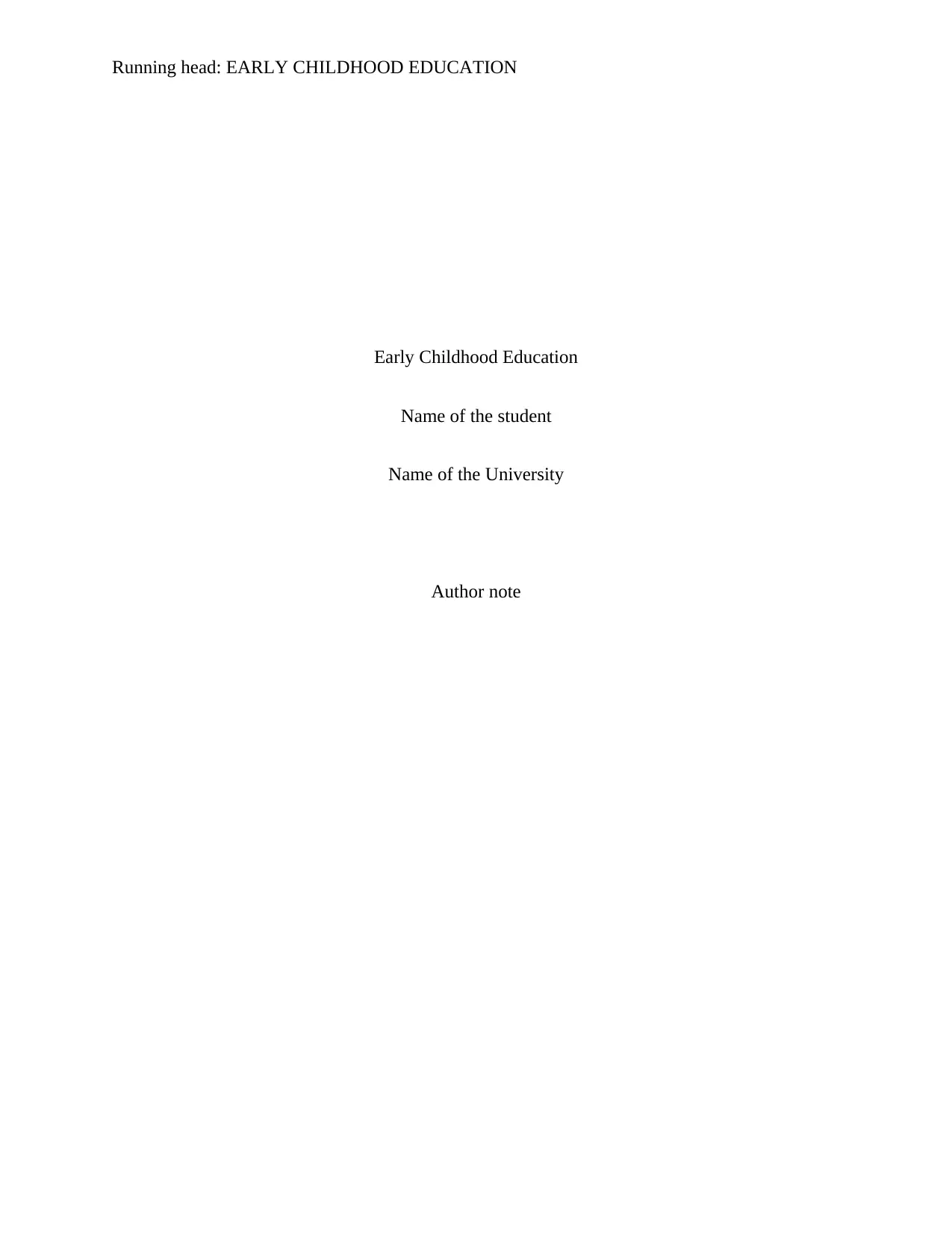
Running head: EARLY CHILDHOOD EDUCATION
Early Childhood Education
Name of the student
Name of the University
Author note
Early Childhood Education
Name of the student
Name of the University
Author note
Paraphrase This Document
Need a fresh take? Get an instant paraphrase of this document with our AI Paraphraser
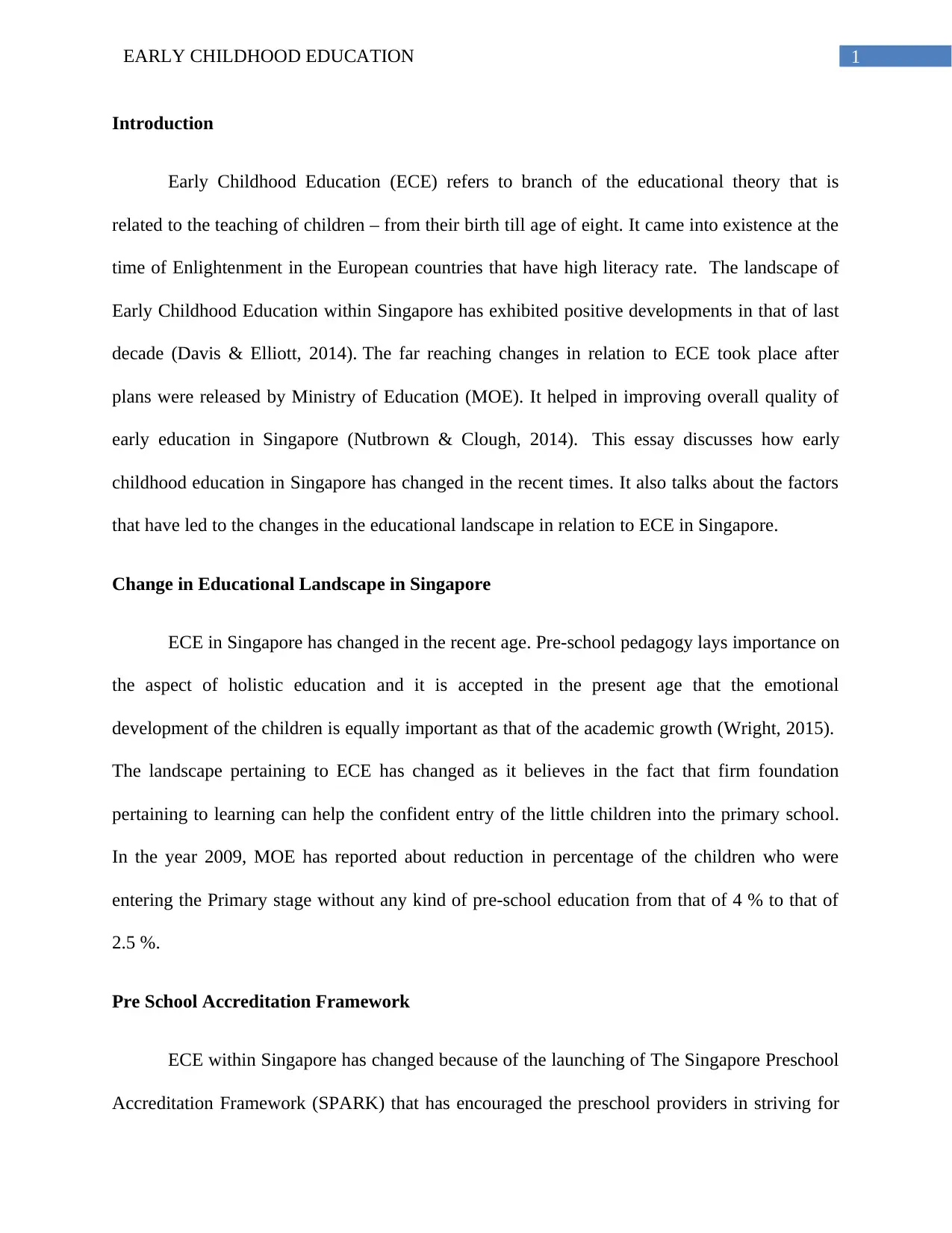
1EARLY CHILDHOOD EDUCATION
Introduction
Early Childhood Education (ECE) refers to branch of the educational theory that is
related to the teaching of children – from their birth till age of eight. It came into existence at the
time of Enlightenment in the European countries that have high literacy rate. The landscape of
Early Childhood Education within Singapore has exhibited positive developments in that of last
decade (Davis & Elliott, 2014). The far reaching changes in relation to ECE took place after
plans were released by Ministry of Education (MOE). It helped in improving overall quality of
early education in Singapore (Nutbrown & Clough, 2014). This essay discusses how early
childhood education in Singapore has changed in the recent times. It also talks about the factors
that have led to the changes in the educational landscape in relation to ECE in Singapore.
Change in Educational Landscape in Singapore
ECE in Singapore has changed in the recent age. Pre-school pedagogy lays importance on
the aspect of holistic education and it is accepted in the present age that the emotional
development of the children is equally important as that of the academic growth (Wright, 2015).
The landscape pertaining to ECE has changed as it believes in the fact that firm foundation
pertaining to learning can help the confident entry of the little children into the primary school.
In the year 2009, MOE has reported about reduction in percentage of the children who were
entering the Primary stage without any kind of pre-school education from that of 4 % to that of
2.5 %.
Pre School Accreditation Framework
ECE within Singapore has changed because of the launching of The Singapore Preschool
Accreditation Framework (SPARK) that has encouraged the preschool providers in striving for
Introduction
Early Childhood Education (ECE) refers to branch of the educational theory that is
related to the teaching of children – from their birth till age of eight. It came into existence at the
time of Enlightenment in the European countries that have high literacy rate. The landscape of
Early Childhood Education within Singapore has exhibited positive developments in that of last
decade (Davis & Elliott, 2014). The far reaching changes in relation to ECE took place after
plans were released by Ministry of Education (MOE). It helped in improving overall quality of
early education in Singapore (Nutbrown & Clough, 2014). This essay discusses how early
childhood education in Singapore has changed in the recent times. It also talks about the factors
that have led to the changes in the educational landscape in relation to ECE in Singapore.
Change in Educational Landscape in Singapore
ECE in Singapore has changed in the recent age. Pre-school pedagogy lays importance on
the aspect of holistic education and it is accepted in the present age that the emotional
development of the children is equally important as that of the academic growth (Wright, 2015).
The landscape pertaining to ECE has changed as it believes in the fact that firm foundation
pertaining to learning can help the confident entry of the little children into the primary school.
In the year 2009, MOE has reported about reduction in percentage of the children who were
entering the Primary stage without any kind of pre-school education from that of 4 % to that of
2.5 %.
Pre School Accreditation Framework
ECE within Singapore has changed because of the launching of The Singapore Preschool
Accreditation Framework (SPARK) that has encouraged the preschool providers in striving for
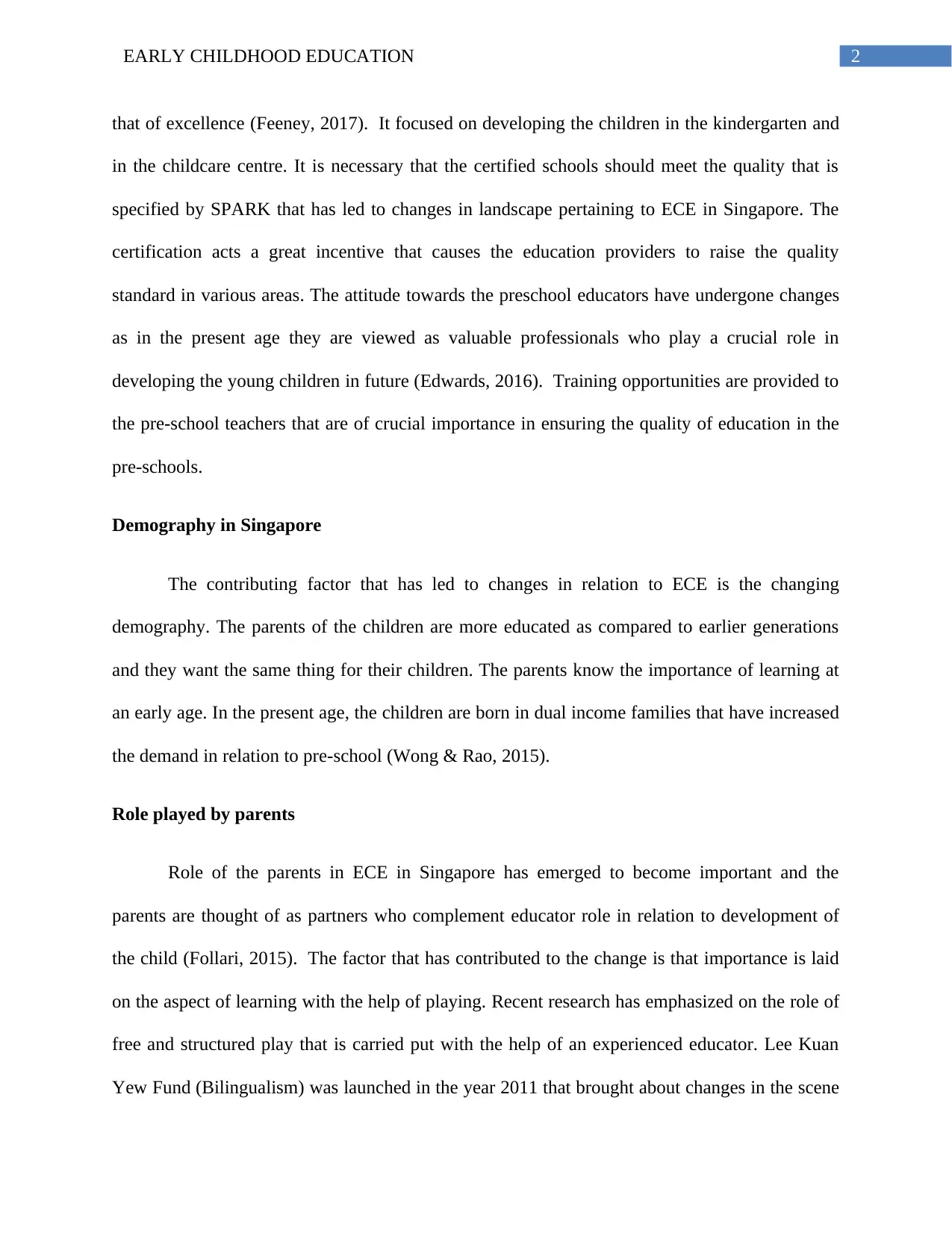
2EARLY CHILDHOOD EDUCATION
that of excellence (Feeney, 2017). It focused on developing the children in the kindergarten and
in the childcare centre. It is necessary that the certified schools should meet the quality that is
specified by SPARK that has led to changes in landscape pertaining to ECE in Singapore. The
certification acts a great incentive that causes the education providers to raise the quality
standard in various areas. The attitude towards the preschool educators have undergone changes
as in the present age they are viewed as valuable professionals who play a crucial role in
developing the young children in future (Edwards, 2016). Training opportunities are provided to
the pre-school teachers that are of crucial importance in ensuring the quality of education in the
pre-schools.
Demography in Singapore
The contributing factor that has led to changes in relation to ECE is the changing
demography. The parents of the children are more educated as compared to earlier generations
and they want the same thing for their children. The parents know the importance of learning at
an early age. In the present age, the children are born in dual income families that have increased
the demand in relation to pre-school (Wong & Rao, 2015).
Role played by parents
Role of the parents in ECE in Singapore has emerged to become important and the
parents are thought of as partners who complement educator role in relation to development of
the child (Follari, 2015). The factor that has contributed to the change is that importance is laid
on the aspect of learning with the help of playing. Recent research has emphasized on the role of
free and structured play that is carried put with the help of an experienced educator. Lee Kuan
Yew Fund (Bilingualism) was launched in the year 2011 that brought about changes in the scene
that of excellence (Feeney, 2017). It focused on developing the children in the kindergarten and
in the childcare centre. It is necessary that the certified schools should meet the quality that is
specified by SPARK that has led to changes in landscape pertaining to ECE in Singapore. The
certification acts a great incentive that causes the education providers to raise the quality
standard in various areas. The attitude towards the preschool educators have undergone changes
as in the present age they are viewed as valuable professionals who play a crucial role in
developing the young children in future (Edwards, 2016). Training opportunities are provided to
the pre-school teachers that are of crucial importance in ensuring the quality of education in the
pre-schools.
Demography in Singapore
The contributing factor that has led to changes in relation to ECE is the changing
demography. The parents of the children are more educated as compared to earlier generations
and they want the same thing for their children. The parents know the importance of learning at
an early age. In the present age, the children are born in dual income families that have increased
the demand in relation to pre-school (Wong & Rao, 2015).
Role played by parents
Role of the parents in ECE in Singapore has emerged to become important and the
parents are thought of as partners who complement educator role in relation to development of
the child (Follari, 2015). The factor that has contributed to the change is that importance is laid
on the aspect of learning with the help of playing. Recent research has emphasized on the role of
free and structured play that is carried put with the help of an experienced educator. Lee Kuan
Yew Fund (Bilingualism) was launched in the year 2011 that brought about changes in the scene
⊘ This is a preview!⊘
Do you want full access?
Subscribe today to unlock all pages.

Trusted by 1+ million students worldwide
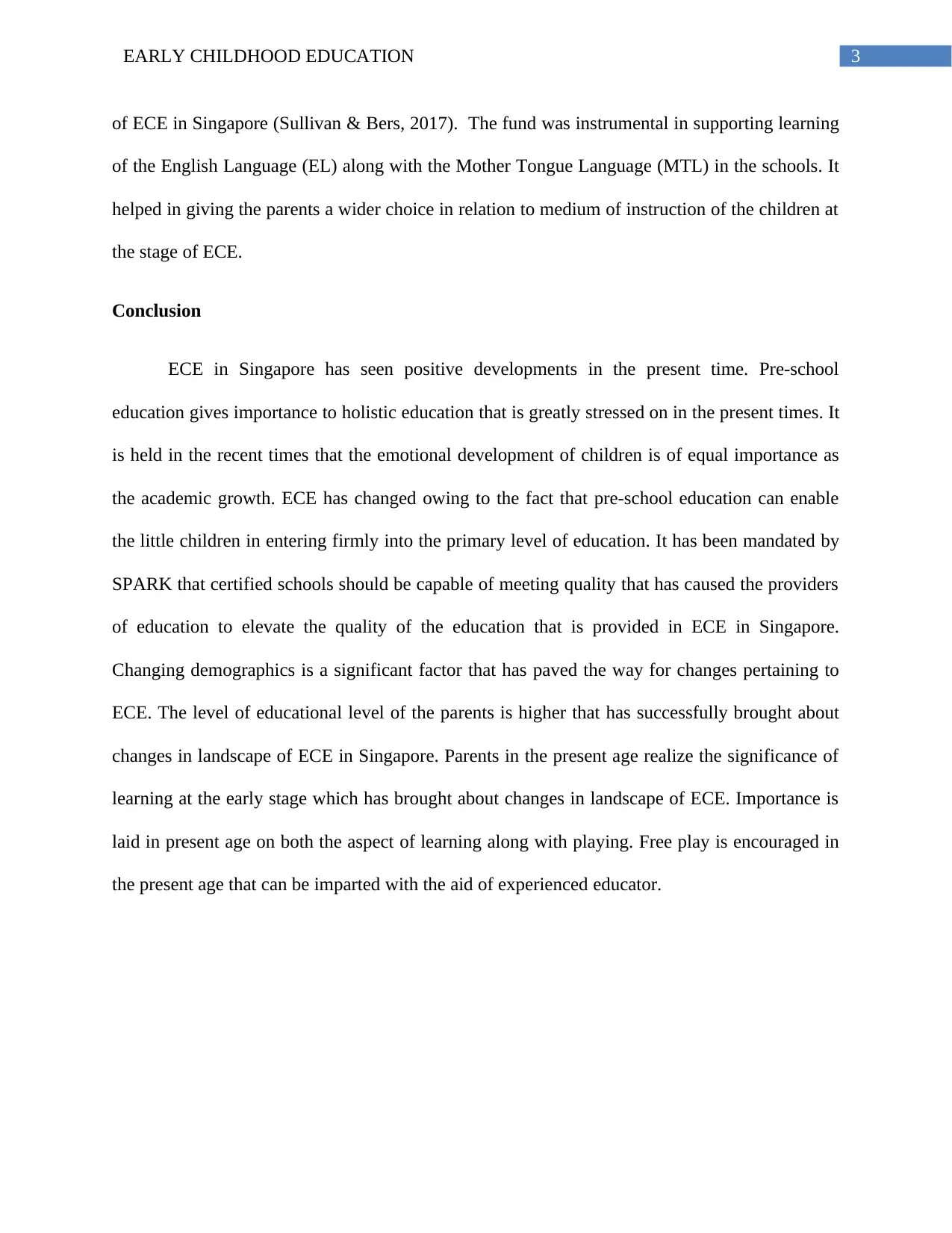
3EARLY CHILDHOOD EDUCATION
of ECE in Singapore (Sullivan & Bers, 2017). The fund was instrumental in supporting learning
of the English Language (EL) along with the Mother Tongue Language (MTL) in the schools. It
helped in giving the parents a wider choice in relation to medium of instruction of the children at
the stage of ECE.
Conclusion
ECE in Singapore has seen positive developments in the present time. Pre-school
education gives importance to holistic education that is greatly stressed on in the present times. It
is held in the recent times that the emotional development of children is of equal importance as
the academic growth. ECE has changed owing to the fact that pre-school education can enable
the little children in entering firmly into the primary level of education. It has been mandated by
SPARK that certified schools should be capable of meeting quality that has caused the providers
of education to elevate the quality of the education that is provided in ECE in Singapore.
Changing demographics is a significant factor that has paved the way for changes pertaining to
ECE. The level of educational level of the parents is higher that has successfully brought about
changes in landscape of ECE in Singapore. Parents in the present age realize the significance of
learning at the early stage which has brought about changes in landscape of ECE. Importance is
laid in present age on both the aspect of learning along with playing. Free play is encouraged in
the present age that can be imparted with the aid of experienced educator.
of ECE in Singapore (Sullivan & Bers, 2017). The fund was instrumental in supporting learning
of the English Language (EL) along with the Mother Tongue Language (MTL) in the schools. It
helped in giving the parents a wider choice in relation to medium of instruction of the children at
the stage of ECE.
Conclusion
ECE in Singapore has seen positive developments in the present time. Pre-school
education gives importance to holistic education that is greatly stressed on in the present times. It
is held in the recent times that the emotional development of children is of equal importance as
the academic growth. ECE has changed owing to the fact that pre-school education can enable
the little children in entering firmly into the primary level of education. It has been mandated by
SPARK that certified schools should be capable of meeting quality that has caused the providers
of education to elevate the quality of the education that is provided in ECE in Singapore.
Changing demographics is a significant factor that has paved the way for changes pertaining to
ECE. The level of educational level of the parents is higher that has successfully brought about
changes in landscape of ECE in Singapore. Parents in the present age realize the significance of
learning at the early stage which has brought about changes in landscape of ECE. Importance is
laid in present age on both the aspect of learning along with playing. Free play is encouraged in
the present age that can be imparted with the aid of experienced educator.
Paraphrase This Document
Need a fresh take? Get an instant paraphrase of this document with our AI Paraphraser
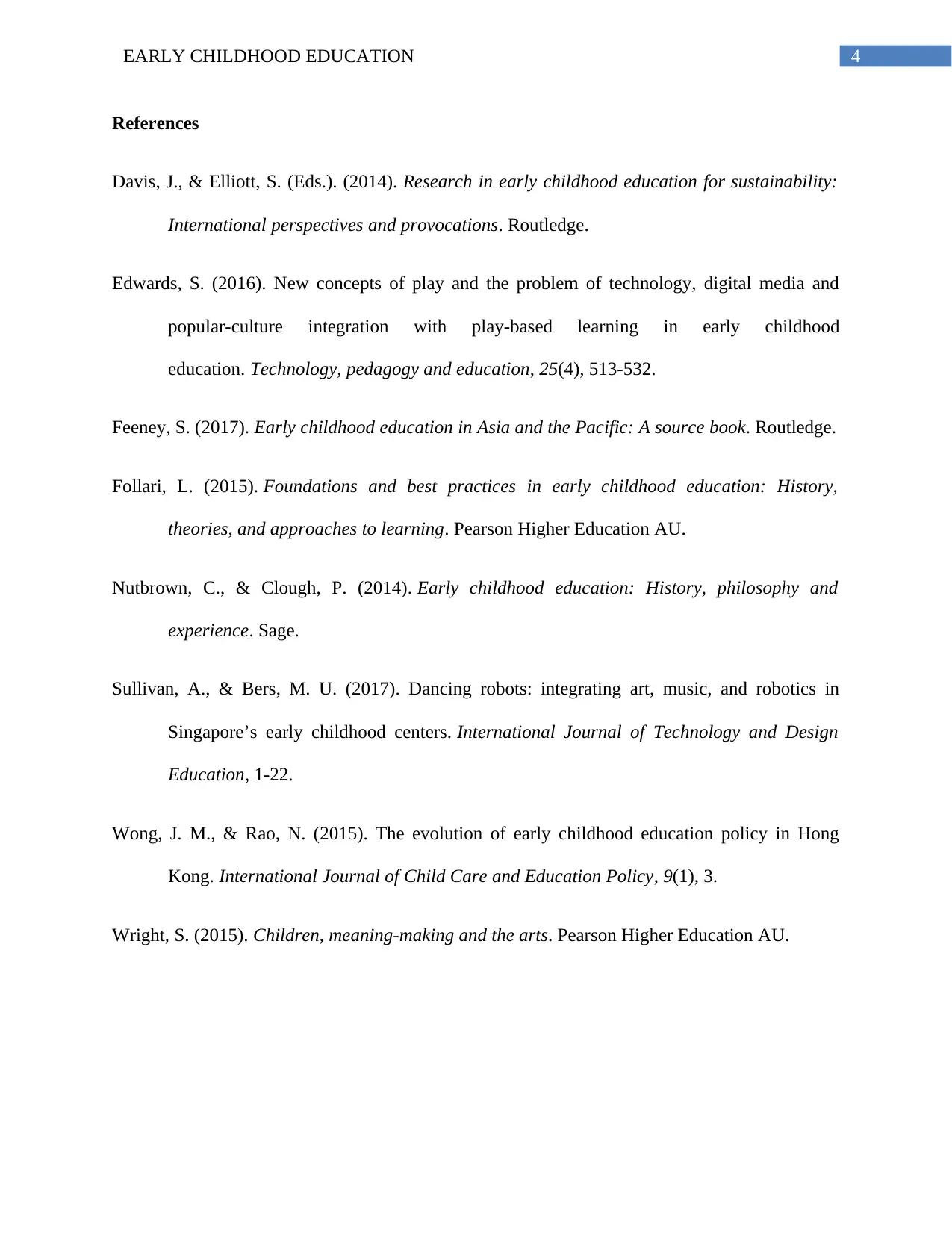
4EARLY CHILDHOOD EDUCATION
References
Davis, J., & Elliott, S. (Eds.). (2014). Research in early childhood education for sustainability:
International perspectives and provocations. Routledge.
Edwards, S. (2016). New concepts of play and the problem of technology, digital media and
popular-culture integration with play-based learning in early childhood
education. Technology, pedagogy and education, 25(4), 513-532.
Feeney, S. (2017). Early childhood education in Asia and the Pacific: A source book. Routledge.
Follari, L. (2015). Foundations and best practices in early childhood education: History,
theories, and approaches to learning. Pearson Higher Education AU.
Nutbrown, C., & Clough, P. (2014). Early childhood education: History, philosophy and
experience. Sage.
Sullivan, A., & Bers, M. U. (2017). Dancing robots: integrating art, music, and robotics in
Singapore’s early childhood centers. International Journal of Technology and Design
Education, 1-22.
Wong, J. M., & Rao, N. (2015). The evolution of early childhood education policy in Hong
Kong. International Journal of Child Care and Education Policy, 9(1), 3.
Wright, S. (2015). Children, meaning-making and the arts. Pearson Higher Education AU.
References
Davis, J., & Elliott, S. (Eds.). (2014). Research in early childhood education for sustainability:
International perspectives and provocations. Routledge.
Edwards, S. (2016). New concepts of play and the problem of technology, digital media and
popular-culture integration with play-based learning in early childhood
education. Technology, pedagogy and education, 25(4), 513-532.
Feeney, S. (2017). Early childhood education in Asia and the Pacific: A source book. Routledge.
Follari, L. (2015). Foundations and best practices in early childhood education: History,
theories, and approaches to learning. Pearson Higher Education AU.
Nutbrown, C., & Clough, P. (2014). Early childhood education: History, philosophy and
experience. Sage.
Sullivan, A., & Bers, M. U. (2017). Dancing robots: integrating art, music, and robotics in
Singapore’s early childhood centers. International Journal of Technology and Design
Education, 1-22.
Wong, J. M., & Rao, N. (2015). The evolution of early childhood education policy in Hong
Kong. International Journal of Child Care and Education Policy, 9(1), 3.
Wright, S. (2015). Children, meaning-making and the arts. Pearson Higher Education AU.
1 out of 5
Related Documents
Your All-in-One AI-Powered Toolkit for Academic Success.
+13062052269
info@desklib.com
Available 24*7 on WhatsApp / Email
![[object Object]](/_next/static/media/star-bottom.7253800d.svg)
Unlock your academic potential
Copyright © 2020–2026 A2Z Services. All Rights Reserved. Developed and managed by ZUCOL.





